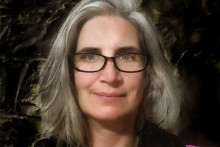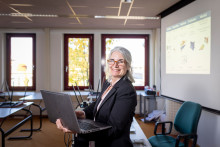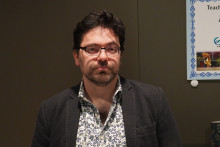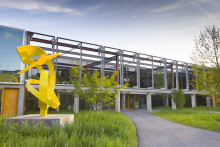justine blanford
The position of professor with a focus on education is intended for scientists with excellent performance in both research and education. Acquiring the title has been possible at the UT since 2018, but Justine Blanford is the first to be appointed to this role. She is an expert on Geographic Information Systems (GIS) and spatial data. Before joining the department of Earth Observation Science at the ITC Faculty of the UT in April, she worked as an associate teaching professor at Penn State University in the USA.
First of all: how are you and where are you?
Blanford: ‘I’m still in our house in Pennsylvania. I’ve already started working for the UT and I was supposed to move to the Netherlands last month, but the global pandemic has prevented that. The move has been temporarily delayed, but otherwise we are all fine.’
As a professor with a focus on education, how will your work differ from the one of a ‘regular professor’?
‘Good question! It is a new position so I expect that there will be a little time before the right balance between education and research is found. Of course, I’ll be carrying out research too just as ‘regular professors’ do but there will also be a large component that actually looks at how we educate our students. And this may involve a whole range of related topics but I imagine it well essentially be looking to see how we can best deliver education across a wider range of learning environments and student backgrounds, how we assess that teaching provision and then how we improve our teaching. The goal is to provide an education experience relevant to both the domain and the needs of the students.’
Why did you decide to accept this position at the UT?
‘I’ve been doing a lot of teaching in recent years, and particularly teaching and mentoring in an online environment – an area that has obviously been at the forefront of our lives recently and an area that’s likely to be increasingly important in the future. Accepting the job wasn’t difficult at all because I felt this was the direction I was already going in and the UT is allowing that to develop much further. And there are so many great things about ITC and UT more generally. There is no other place in the world with such a high concentration of geospatial faculty. I also had personal reasons – my kids. Living here in Pennsylvania has been great, but I want my kids to experience new things.’
Can you tell me more about your background?
‘I was born in Trinidad, and at just two weeks old moved to Suriname. I was there for ten years and then moved to Canada, then Kenya, UK, and Bangladesh. More recently I’ve lived in Columbia, Scotland and of course now the US. So quite a footloose upbringing. But because I grew up in different parts of the world, I always found geography a fun subject. The Geospatial side of things came later. I thought it was a good skillset to have, that it would allow me to get a job anywhere in the world. And it has because the discipline can be applied to so many research topics it has allowed me to work on plant health, invasive pests, food security, forestry, human movement and over the last few years on health and disease related projects. My more recent emphasis has been educational though, assessing what skillsets the students were acquiring as well as how they interpreted the value of their degree themselves, so that we could make improvements to the learning method.’
What type of health related projects have you worked on?
‘For example, I spent some time looking at malaria and its mosquito vectors examining how variations in the environment influence transmission. And I’ve looked at the connectivity between places in a malaria context, to look at likely areas of human mediated transport of malaria parasites. The current pandemic has prompted a new project. Right now I’m working with an epidemiologist to figure out ways how to help health professionals through GIS. We’d like to train students and professionals in geospatial technologies and techniques, so that they can quickly and efficiently analyse and represent how a disease may spread. The need for this became very apparent during the COVID-19 pandemic. This project also fits very nicely with what I will be doing at ITC. One of my main goals at the UT is to develop a strong Geohealth programme. It has always been an important topic but now more than ever before.’
You started your new position at ITC on the 1st of April, but you were forced to stay in the US for now. Have you been able to work? It must be strange to start at a new institute remotely.
‘I’m able to work though yes, it is a little strange. But, it’s actually going fine. All meetings are done online, all research material is online. It would of course be much nicer to be in Enschede at ITC to meet my new colleagues and have a coffee and a chat with them informally but that will come soon enough. I have had to adjust my working day though. In the first week I already had scheduled meetings that started at 3AM my time. My working day now starts while the rest of my family is still fast asleep – I’m almost in a different time zone in the same house! Hopefully we can all move soon and meet everyone face to face.’
You are moving with your whole family. Are you excited to live in the Netherlands?
‘Absolutely! We visited last summer and we really liked Enschede. As I mentioned I spent ten years in Surinam when I was young and learnt to speak Dutch there and we had a number of Dutch friends. I can still remember some Dutch and a lot of the food and culture are familiar. And generally, we are also looking forward to being able to cycle everywhere and not have to rely on a car so much. Having a wider choice of cafés and places to eat will also be nice. And then we will be back in Europe which we are all looking forward to with the opportunities it brings for visiting all sorts of different places my children have only heard my husband and I talk about before. We are all very much looking forward to the move.’







